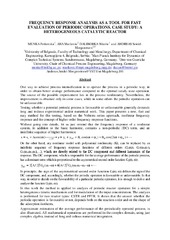Приказ основних података о документу
Frequency response analysis as a tool for fast evaluation of periodic operations. Case study: A heterogeneous catalytic reacator
| dc.creator | Petkovska, Menka | |
| dc.creator | Nikolić, Daliborka | |
| dc.creator | Marković, Ana | |
| dc.creator | Seidel-Morgenstern, Andreas | |
| dc.date.accessioned | 2021-03-10T11:01:16Z | |
| dc.date.available | 2021-03-10T11:01:16Z | |
| dc.date.issued | 2009 | |
| dc.identifier.uri | http://TechnoRep.tmf.bg.ac.rs/handle/123456789/1368 | |
| dc.description.abstract | One way to achieve process intensification is to operate the process in a periodic way, in order to obtain better average performance compared to the optimal steady-state operation. The source of the possible improvement lies in the process nonlinearity. Nevertheless, the improvement is obtained only in some cases, while in some others the periodic operation can be unfavourable. Testing whether a potential periodic process is favourable or unfavourable generally demands long and tedious experimental and/or numerical work. This paper presents a new, fast and easy method for this testing, based on the Volterra series approach, nonlinear frequency response and the concept of higher order frequency response functions. | en |
| dc.relation | info:eu-repo/grantAgreement/MESTD/MPN2006-2010/142014/RS// | |
| dc.rights | openAccess | |
| dc.rights.uri | https://creativecommons.org/licenses/by/4.0/ | |
| dc.source | 2nd European Process Intensification Conference (EPIC 2009), Venice, Italy | |
| dc.subject | periodic process | sr |
| dc.subject | Volterra series approach | sr |
| dc.subject | nonlinear frequency response | sr |
| dc.subject | higher order frequency response functions | sr |
| dc.title | Frequency response analysis as a tool for fast evaluation of periodic operations. Case study: A heterogeneous catalytic reacator | en |
| dc.type | conferenceObject | |
| dc.rights.license | BY | |
| dc.identifier.fulltext | http://TechnoRep.tmf.bg.ac.rs/bitstream/id/142/1365.pdf | |
| dc.identifier.rcub | https://hdl.handle.net/21.15107/rcub_technorep_1368 | |
| dc.type.version | publishedVersion |

